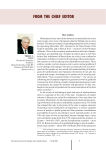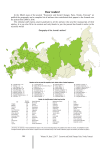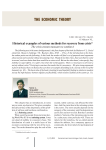Economic and Social Changes: Facts, Trends, Forecast @volnc-esc-en
Статьи журнала - Economic and Social Changes: Facts, Trends, Forecast
Все статьи: 1763
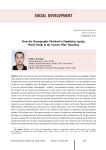
From the demographic dividend to population ageing: world trends in the system-wide transition
Статья научная
In the 21st century, the increasing intensity of quantitative and qualitative demographic changes is becoming one of the most important factors that determine the direction of socio-economic development. Global downward trends in the birth and death rates have created conditions for the demographic system to shift to a new qualitative state. Humanity is at the crossroads of a transition between two phenomena it has not witnessed before: demographic “window” and population ageing. Under the circumstances, the research on the factors and implications of this system-wide transition is becoming increasingly important, because obtaining relevant information about the actual and forecast states of the demographic system is one of the key tasks of strategic planning for sustainable development. In this regard, the goal of the present research is to study the patterns, characteristics and driving forces of transition of the world population from the stage of realization of the demographic dividend to the stage of ageing. In our research we use fundamental works of foreign and domestic scientists and United Nations and World Bank statistics. In the first part of the article we consider approaches to the term “demographic dividend” and its conceptual substantiation, drivers of its formation and options to implement the demographic window. The second part of the paper presents the results of testing the methodology for determining the degree of implementation of the demographic dividend and the transformation of the age structure towards its ageing. We conclude that in the countries that are implementing the catching-up development model (from both the economic and demographic points of view; the “yellow group”) the intensity and depth of the implementation of the demographic dividend is significantly higher than in the countries that have already completed it (mainly developed countries - the “red group”). At the same time we argue that the width of the demographic window of opportunity is directly proportional to the scale of potential impact of population ageing, which inevitably follows the stage of the dividend implementation.
Бесплатно
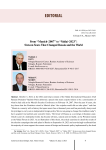
From “Munich-2007” to “Valdai-2023”: sixteen years that changed Russia and the world
Статья научная
October 5, 2023, at the 20th anniversary session of the Valdai International Discussion Club Russian President Vladimir Putin delivered a speech that many experts believe to be a continuation of what he had said at the Munich Security Conference on February 10, 2007. Over the past 16 years, the key theses that the President voiced in Munich (that “the unipolar world did not take place” and that “Russia is a country with a history that spans more than a thousand years and has practically always used the privilege to carry out an independent foreign policy. We are not going to change this tradition today”) have acquired real outlines and concrete forms. The future of Russia as a sovereign civilization-state, which is part of a multipolar world, has become obvious, natural and inevitable, as the President stated at the Valdai Forum in 2023. As an illustration of this thesis, the article examines in detail the results of the election campaigns that took place in Russia on September 10, 2023 and convincingly confirmed that the majority of voters support the current course of foreign and domestic policy implemented by the head For citation: Ilyin V.A., Morev M.V. (2023). From “Munich 2007” to “Valdai 2023”: Sixteen years that changed Russia and the world. Economic and Social Changes: Facts, Trends, Forecast, 16(5), 9-31. DOI: 10.15838/esc.2023.5.89.1 of state. The article presents our calculations based on official data of the Central Election Commission of the Russian Federation; we carry out an in-depth comparative analysis of the results of the regional elections of 2018 and 2022, and analyze voting results in the context of regional centers; we also consider factors that influenced voter turnout. This makes it possible to identify new and more in-depth features of public sentiment, according to which a significant part of voters demands that the current elites (political, economic, cultural) be brought in line with the national socio-political agenda related to the goals of the special military operation and the positioning of Russia as a civilization-state. In general, the analysis has shown that both inside Russia and in the international political arena, there are still a lot of forces desperately clinging to the “old” world order and hindering the natural course of the changes taking place. This suggests that the process of transformation of Russia and the whole world, which in fact began 16 years ago, has not yet been completed and, apparently, this task is postponed for 2024-2032 - the period that may become the next presidential term for Vladimir Putin. At the same time, the successful achievement of all the goals of the special military operation was and remains the main prerequisite for the implementation of Russia’s transformation.
Бесплатно
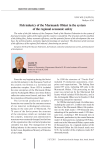
Functions of small business in the development of the middle class in Russia
Статья научная
As international experience shows, small business performs a significant function in the development of middle class. It is therefore necessary to characterize the state of small business in today’s socio-economic system of Russia, to identify the characteristics of small businesses representatives that identify it with the middle class, to determine the function of small businesses in the development of the middle class, to develop measures to support small businesses. The paper uses the methods of content, structural, functional and stratification analysis, presents the results of expert surveys and sociological studies conducted by domestic scientists and also by the author.
Бесплатно
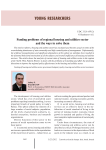
Funding problems of regional housing and utilities sector and the ways to solve them
Статья научная
The need to reform a housing and utilities sector has escalated and become actual in terms of the overwhelming dominance of state ownership and high centralization of management. Unfortunately, the artificial monopolization and significant dependence of this sphere on subsidies have resulted in the distorted behavioral motivation of all the subjects and overall inefficiency of housing and utilities services. The article shows the analysis of current state of housing and utilities sector in the regions of the North-West Federal District; it deals with the problems of its funding and offers the promising directions to improve the regional policy effectiveness in the housing and utilities sector.
Бесплатно

Funding research and development in regions: tasks, current state, prospects
Статья научная
Financing the research and development sector is an important condition for growth of innovation activity in regions. However, the share of research and development (R&D) expenses in Russia has been decreasing over the last ten years. According to this indicator, Russia lags behind other countries - leaders of innovation development 3-4 times. The formation of funds to support research, scientific and technological, and innovation activities can contribute to the growth of the volume of R&D financing. The purpose of the study is to examine the organizational conditions for the formation of funds to support research, scientific and technological, and innovation activities. Using statistical data from Rosstat, we calculated the variants of growth of R&D costs provided that regional funds are created, the budget of which is formed by deductions from the revenues of organizations in the amount of up to 1.5%. We have identified groups of companies whose financial resources could be a source of formation of the funds budget. The article identifies the main directions and volume of use of finances accumulated in the funds. In the final part of the article we reviewed the support measures for companies that participate in filling the budget of the funds, and proposed adjustments to the main areas of incentives for organizations. The scientific novelty of the presented work lies in the implementation of a comprehensive study of the supporting funds for research, scientific and technological, and innovation activities in the RF constituent entities as a tool for the growth of R&D expenditures. The latter includes studying the issues of financial filling of the funds budget, determining the directions and calculating the possible volume of spending of accumulated funds on them, as well as adjusting the existing measures to encourage organizations to participate in financing the funds budget. The practical significance of the work lies in the fact that its results can serve as an economic justification and organizational support for the creation of regional funds by regional authorities. In addition, the materials of the study can be used to develop a separate federal law regulating the creation and operation of the funds in question.
Бесплатно
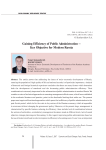
Gaining efficiency of public administration - key objective for modern Russia
Статья научная
The article proves that addressing the issues of socio-economic development of Russia, ensuring the population's high quality of life and national security is of particular importance. Analysis of domestic and foreign historical experience concludes that there are many factors which determine both the development of statehood and the decreasing public administration efficiency. Their consideration is extremely important for the reformation of public administration in modern Russia. We consider a series of technical approaches to assessing management effectiveness, which have established in the academic literature and practice, point to the drawbacks limiting their wider use. The present paper uses target and functional approaches which prove the inefficiency of public administration in the post-Soviet period, which led to the crisis in key sectors of the Russian economy, which is impossible to overcome without changing the government policy. Moreover, at the present stage, management is characterized by specific features reducing its efficiency; these include lack of coordination between the actions of authorities, contradictory management decisions made at different levels, lack of sound objective strategic planning and forecasting...
Бесплатно
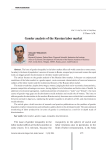
Gender analysis of the Russian labor market
Статья научная
The issue of gender inequality in the labor market affects all world countries to some extent. As salary is the basis of population’s sources of income in Russia, unequal pay to men and women for equal work can trigger gender discrimination in the labor market and beyond. The article focuses on the gender analysis of the Russian labor market. It focuses on conjunctural conditions of the labor market in a gender aspect, socio-economic characteristics of men and women as subjects of the labor market and the institutional features of the Russian labor market. The study reveals that, despite lower wages, women, judging by their socio-economic characteristics, possess competitive advantages over men, having higher level of education and better state of health. In addition to horizontal segregation, traditional partition of industries to “male” and “female”, the main causes of gender wage gaps are discriminatory social attitudes and social role of women. The issue to address gender discrimination in the modern Russian society becomes more critical due to contradiction between normative-legal acts, stipulating the gender equality in all spheres of life, and discriminatory social attitudes...
Бесплатно
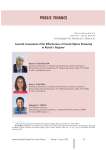
General assessment of the effectiveness of social sphere financing in Russia's regions
Статья научная
The paper presents an approach to assessing the effectiveness of social sphere financing (healthcare, education, housing and utilities sector) in regions of Russia. In the framework of the study, we test the following hypothesis: when the socio-economic situation in a region gets better, the effectiveness of social sphere financing in it reduces. The methodology for studying the effectiveness of social sphere financing in regions with different levels of socio-economic development is based on assessing the dependence of the dynamics of the indicators achieved by them and the amount of budget expenditures. To carry out the assessment, we select nine resulting indicators of the functioning of social sectors, taking into account the list of indicators for assessing the effectiveness of performance of executive authorities of constituent entities of the Russian Federation (the list was approved in November 2017 by the decree of the President of the Russian Federation) and on the basis of the presence of a statistical relation between them and the Human Development Index as a final indicator...
Бесплатно
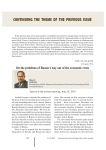
Статья научная
It is typical of modern Russia to have not only decline in population size but also its quality loss. The author actualizes the problem of preservation and increasing of human capital quality through creating of a governmental and public system of long-term complex support for gifted children from the first talent expression to professional self-determination. This article deals with theoretical and methodological foundations to solve this problem; it presents methods and forms of government, scientific and educational institutions activity in this area. The author emphasizes analysis of operational experience with talented youth of regional Research and Education Center of Economics and Information Technology under Institute of Socio-Economic Development of Territories of RAS. The author examines methods of operation of the REC in generation of talented youth’s knowledge through involvement them in research activities and using of other forms contributing to intellectualization of human capital of students.
Бесплатно
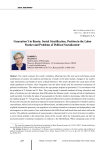
Статья научная
The article analyzes the youth's problems affecting their life and social well-being (social stratification of society; the position and behavior of youth in the labor market; changes in the youth's value orientations and models of socio-cultural behavior). The article describes the social status of the youth population in Russia, their integration into the labor market and the emotional component of political socialization. The authors analyze the age groups assigned to generation Y in accordance with the gradation of V. Strauss and N. Hau. The young people's material standard of living, education and place of residence are the indicators that differentiate the Russian youth, creating a kind of stratification youth pyramid. Currently, the place of young people in the labor market is decreasing, while the share of the employed aged 55-72 is growing, which negatively affects the innovative development of the economy. Services have become the dominant industry for youth employment. The socialization of modern youth is contradictory, which is due to deep social differentiation, unstable position in the labor market, the impact of global information processes, the opposition of a tolerant attitude to otherness and independence and intransigence to other points of view and behaviors that differ from traditional ideas and values within the society. The political socialization of young people is characterized by a low level of interest in politics, a more critical attitude to the democratic status of the country when the respondents grow up with an increased positive emotional component in relation to the Motherland. When comparing some of the characteristics of these generations in the Russian Federation with the characteristics of the youth in European countries at different levels of development, Poland, the Czech Republic, Spain, Germany, and Sweden, their uniqueness is revealed, due to the severity of many problems of economic and democratic development in Russia. The data from Rosstat, the author's empirical research, and the European social research (ESS) were used in the study.
Бесплатно
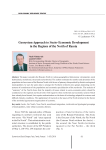
Geosystem approach to socio-economic development in the regions of the north of Russia
Статья научная
The paper considers the Russian North in various geographical dimensions: circumpolar, zonal (latitudinal), meridional, structural and territorial. The author estimates the number and dynamics of the population in three zones of the Russian North with the use of primary data provided by district and regional municipalities; he uses the same data to arrange the Northern territories into groups depending on the systems of resettlement of the population and economic specialization of the territories. The analysis of “anatomy” of the North shows that the majority of issues related to socio-economic policy should be considered at the regional and local levels with regard to those territorial and economic systems which have already been formed, but require modernization on the basis of technology adapted for extreme and difficult climatic conditions. The applied part of research on the issues of the North is linked to the theory of the territorial (geosystem) organization of economy.
Бесплатно
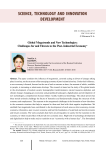
Global Megatrends and New Technologies: Challenges for and Threats to the Post-Industrial Economy
Статья научная
The paper considers the influence of megatrends, currently acting as drivers of changes taking place in society, on the structure of the emerging economy of post-industrial society. Under their influence, a new economy is formed, focused on the use of such a resource as time, the amount of which, available to people, is increasing as robotomics develops. The research is based on the study of five global trends in the development of modern society: demographic transformations; natural resources depletion and climate change; changing geo-economic and geopolitical landscapes; digitalization and development of new technologies; comprehensive human welfare: wealth, health and knowledge. The article proves that these trends seriously challenge the future of humanity and fundamentally change the structure of the economy and employment. The response to the megatrends challenges is the formation of new directions in the economic structure that help to respond to them and deal with their negative implications. We establish that megatrends have contributed to the development of such areas as silver economy, circular economy, robotomics, peer-to-peer economy, and laid the foundation of a spiritual and moral economy and leisure economy. The work concludes that there are prerequisites in society for the transition to the economy, in which social effects will prevail over economic ones. High level of technology development and digitalization help to make such a transition to an “economics with a human face”. The formulated principles of adaptation to the emerging economy enable countries to develop a transition strategy with minimal social and economic costs. The novelty of the research consists in comparing megatrends with changes occurring in the structure of the economy and the labor market, as well as in substantiating social orientation of the post-industrial economy, which is formed under the influence of global trends in social development.
Бесплатно
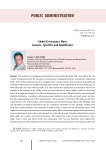
Global governance wars: Genesis, specifics and significance
Статья научная
The modern era of political confrontation in the second half of the 20th –first half of the 21st century is characterized by the transition to the doctrine of global governance wars between conflicting States. The essence of this doctrine is to strengthen one’s own governance system as much as possible and critically weaken the enemy’s public administration system so that all the links of the state body cease to work effectively and cope with their tasks. The paper reveals the significance of governance wars on the example of the collapse of the USSR, which occurred without any direct military clash, but led to the loss of all strategic advantages for the Russian Federation, its successor. We put forward a structural model of global dominance, according to which governance depends on hard, soft, and smart power; we show that this understanding comes from generalizing J. Nye’s concept of soft power. We define the specifics of governance wars: long duration, all-encompassing and uncompromising nature. The following tools and algorithms of modern governance wars are considered: promotion of own ideology; working with local elites; masks syndrome and conspiracy in political elites; control over the information space; color revolutions; proxy wars; destruction of medical sovereignty. We reveal the relationship between governance wars and governance cycles that imply fluctuations in the effectiveness of public administration system both within one country and between countries. We consider five levels of social phenomena: meta, mega, macro, meso and micro levels, and substantiate their two-way hierarchy, when higher-level processes determine the development vector for lower-level processes, and lower-level processes form the mechanisms for implementing higher-level processes. We show that in modern conditions this paradigm is gaining importance, preventing the formation of distorted cognitive patterns in relation to the driving forces of national development.
Бесплатно

